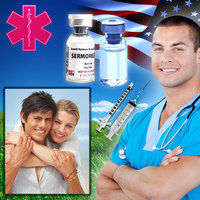Introduction to Low Testosterone
Low testosterone, or hypogonadism, is increasingly recognized as a prevalent health concern among American males. This condition, characterized by the body's inability to produce sufficient testosterone, can lead to a myriad of symptoms that significantly impact quality of life. As awareness grows, it becomes imperative to understand the implications, causes, and management strategies for low testosterone.
Symptoms and Impact on Health
The symptoms of low testosterone can be subtle yet profoundly affect an individual's well-being. Common manifestations include reduced libido, erectile dysfunction, decreased muscle mass, increased body fat, and fatigue. These symptoms not only affect physical health but also contribute to psychological issues such as depression and anxiety. For American men, who often face societal pressures to maintain peak physical and mental performance, the impact of low testosterone can be particularly distressing.
Prevalence Among American Males
Recent studies suggest that low testosterone is more common than previously thought, with estimates indicating that up to 40% of men over 45 may experience some degree of testosterone deficiency. This prevalence underscores the need for increased screening and awareness, especially as the American male population ages and lifestyle factors continue to influence hormonal health.
Causes of Low Testosterone
The etiology of low testosterone is multifactorial. Aging is a primary contributor, as testosterone levels naturally decline with age. However, lifestyle factors such as obesity, poor diet, lack of exercise, and chronic stress can exacerbate this decline. Additionally, medical conditions like diabetes, sleep apnea, and certain genetic disorders can lead to hypogonadism. Understanding these causes is crucial for developing effective prevention and treatment strategies.
Diagnosis and Screening
Diagnosing low testosterone involves a comprehensive evaluation, including a detailed medical history, physical examination, and blood tests to measure testosterone levels. The Endocrine Society recommends testing for men with symptoms suggestive of low testosterone, particularly those with conditions known to be associated with hypogonadism. Early diagnosis is essential for timely intervention and management.
Treatment Options
Treatment for low testosterone typically involves testosterone replacement therapy (TRT), which can be administered through injections, gels, patches, or pellets. TRT has been shown to improve symptoms such as libido, energy levels, and muscle mass. However, it is not without risks, including potential side effects like sleep apnea, acne, and an increased risk of blood clots. Therefore, treatment should be individualized, with close monitoring by healthcare professionals.
Lifestyle Modifications
In addition to medical interventions, lifestyle modifications play a critical role in managing low testosterone. Regular exercise, particularly resistance training, can help boost testosterone levels. A balanced diet rich in nutrients, adequate sleep, and stress management techniques are also essential. For American men, adopting a healthier lifestyle can not only mitigate the effects of low testosterone but also enhance overall well-being.
The Role of Awareness and Education
Increasing awareness and education about low testosterone is vital for American males. Public health campaigns, educational programs, and open dialogues between patients and healthcare providers can help demystify the condition and encourage men to seek help. By fostering a supportive environment, we can empower men to take proactive steps toward managing their hormonal health.
Conclusion
Low testosterone represents a silent epidemic among American males, with far-reaching implications for health and quality of life. By understanding its symptoms, causes, and treatment options, we can better address this condition. Through a combination of medical intervention, lifestyle changes, and increased awareness, American men can overcome the challenges posed by low testosterone and lead healthier, more fulfilling lives.
Contact Us For A Fast And Professional Response

- Environmental Toxins and Declining Testosterone Levels in American Men: A Growing Concern [Last Updated On: March 10th, 2025] [Originally Added On: March 10th, 2025]
- Chronic Illness and Low Testosterone in American Males: Impacts and Management Strategies [Last Updated On: March 17th, 2025] [Originally Added On: March 17th, 2025]
- Managing Low Testosterone in Aging Men: Symptoms, Causes, and Treatment Options [Last Updated On: March 19th, 2025] [Originally Added On: March 19th, 2025]
- Low Testosterone's Impact on Cognitive Function in American Men: Interventions and Insights [Last Updated On: March 19th, 2025] [Originally Added On: March 19th, 2025]
- Low Testosterone and Mood Disorders in American Men: A Comprehensive Overview [Last Updated On: March 19th, 2025] [Originally Added On: March 19th, 2025]
- Vitamin D's Role in Managing Low Testosterone in American Men: Insights and Strategies [Last Updated On: March 19th, 2025] [Originally Added On: March 19th, 2025]
- Low Testosterone's Rising Economic Impact on American Healthcare [Last Updated On: March 19th, 2025] [Originally Added On: March 19th, 2025]
- Alcohol Consumption and Its Effects on Testosterone Levels in Men [Last Updated On: March 20th, 2025] [Originally Added On: March 20th, 2025]
- Low Testosterone in American Men: Symptoms, Diagnosis, and Treatment Options [Last Updated On: March 20th, 2025] [Originally Added On: March 20th, 2025]
- Low Testosterone: Impacts on Prostate Health and Cancer Risk in American Men [Last Updated On: March 20th, 2025] [Originally Added On: March 20th, 2025]
- Low Testosterone's Impact on Muscle Mass and Strength in American Males [Last Updated On: March 21st, 2025] [Originally Added On: March 21st, 2025]
- Low Testosterone's Impact on Skin Health in American Men: Causes and Management [Last Updated On: March 22nd, 2025] [Originally Added On: March 22nd, 2025]
- Smoking's Impact on Testosterone Levels in American Men: Health Risks and Quitting Strategies [Last Updated On: March 22nd, 2025] [Originally Added On: March 22nd, 2025]
- Low Testosterone and Diabetes: Managing Dual Health Challenges in American Males [Last Updated On: March 22nd, 2025] [Originally Added On: March 22nd, 2025]
- Low Testosterone's Impact on Immune Function in American Males: Insights and Management [Last Updated On: March 23rd, 2025] [Originally Added On: March 23rd, 2025]
- Common Medications Linked to Low Testosterone in American Men: Insights and Management [Last Updated On: March 23rd, 2025] [Originally Added On: March 23rd, 2025]
- Zinc's Role in Boosting Testosterone Levels in American Men [Last Updated On: March 23rd, 2025] [Originally Added On: March 23rd, 2025]
- Shift Work's Impact on Testosterone Levels in American Men: Insights and Strategies [Last Updated On: March 23rd, 2025] [Originally Added On: March 23rd, 2025]
- Low Testosterone and Osteoporosis Risk in American Males: Insights and Strategies [Last Updated On: March 23rd, 2025] [Originally Added On: March 23rd, 2025]
- Low Testosterone and Heart Disease Risk in American Men: Current Insights [Last Updated On: March 23rd, 2025] [Originally Added On: March 23rd, 2025]
- Weight Loss Boosts Testosterone: A Vital Strategy for American Males [Last Updated On: March 23rd, 2025] [Originally Added On: March 23rd, 2025]
- Low Testosterone: Symptoms, Impacts, and Treatment Options for American Men [Last Updated On: March 24th, 2025] [Originally Added On: March 24th, 2025]
- Low Testosterone in Aging Men: Symptoms, Diagnosis, and Treatment Options [Last Updated On: March 24th, 2025] [Originally Added On: March 24th, 2025]
- Chronic Stress and Testosterone: Impacts and Management Strategies for American Men [Last Updated On: March 24th, 2025] [Originally Added On: March 24th, 2025]
- Liver Health's Crucial Role in Managing Testosterone Levels for American Males [Last Updated On: March 24th, 2025] [Originally Added On: March 24th, 2025]
- Chronic Inflammation's Impact on Testosterone Levels in American Males: A Comprehensive Analysis [Last Updated On: March 25th, 2025] [Originally Added On: March 25th, 2025]
- Low Testosterone Linked to Increased Autoimmune Disease Risk in American Men [Last Updated On: March 25th, 2025] [Originally Added On: March 25th, 2025]
- Low Testosterone and Hair Loss in American Males: Mechanisms, Impacts, and Interventions [Last Updated On: March 25th, 2025] [Originally Added On: March 25th, 2025]
- Low Testosterone in American Males: Impact on Libido and Quality of Life [Last Updated On: March 25th, 2025] [Originally Added On: March 25th, 2025]
- Dietary Impact on Testosterone: Insights for American Men's Hormonal Health [Last Updated On: March 25th, 2025] [Originally Added On: March 25th, 2025]
- Herbal Supplements for Low Testosterone: Benefits, Limitations, and Key Herbs Reviewed [Last Updated On: March 25th, 2025] [Originally Added On: March 25th, 2025]
- Nutritional Deficiencies and Low Testosterone in American Males: Insights and Strategies [Last Updated On: March 26th, 2025] [Originally Added On: March 26th, 2025]
- Low Testosterone's Impact on Emotional Wellbeing in American Males: Symptoms and Solutions [Last Updated On: March 26th, 2025] [Originally Added On: March 26th, 2025]
- Low Testosterone and Depression in American Men: Links, Mechanisms, and Treatment Options [Last Updated On: March 26th, 2025] [Originally Added On: March 26th, 2025]
- Low Testosterone and Anemia: Impacts and Management in American Men [Last Updated On: March 26th, 2025] [Originally Added On: March 26th, 2025]
- Low Testosterone's Impact on American Males: Body Composition and Health Challenges [Last Updated On: March 26th, 2025] [Originally Added On: March 26th, 2025]
- Low Testosterone Linked to Dermatological Issues in American Men: A Comprehensive Overview [Last Updated On: March 26th, 2025] [Originally Added On: March 26th, 2025]
- Exercise Boosts Testosterone: A Guide for American Men [Last Updated On: March 26th, 2025] [Originally Added On: March 26th, 2025]
- Low Testosterone and Metabolic Syndrome: Risks and Prevention in American Men [Last Updated On: March 26th, 2025] [Originally Added On: March 26th, 2025]
- Genetic Factors Influencing Low Testosterone in American Males: A Comprehensive Overview [Last Updated On: March 27th, 2025] [Originally Added On: March 27th, 2025]
- Low Testosterone Linked to Neurological Risks in American Men: Implications and Interventions [Last Updated On: March 27th, 2025] [Originally Added On: March 27th, 2025]
- Low Testosterone and Thyroid Disorders: Impact and Management in American Men [Last Updated On: March 27th, 2025] [Originally Added On: March 27th, 2025]
- Sleep Apnea's Impact on Testosterone Levels in American Males: A Comprehensive Analysis [Last Updated On: March 27th, 2025] [Originally Added On: March 27th, 2025]
- Low Testosterone Linked to Increased Kidney Disease Risk in American Men [Last Updated On: March 27th, 2025] [Originally Added On: March 27th, 2025]
- Hormonal Imbalance and Low Testosterone: Causes, Symptoms, and Treatment in American Males [Last Updated On: March 28th, 2025] [Originally Added On: March 28th, 2025]
- Low Testosterone and Insulin Resistance: Impact and Management in American Men [Last Updated On: March 28th, 2025] [Originally Added On: March 28th, 2025]
- Environmental Estrogens and Their Impact on Testosterone Levels in American Males [Last Updated On: March 28th, 2025] [Originally Added On: March 28th, 2025]
- Chronic Pain's Impact on Testosterone Levels in American Males: Management Strategies [Last Updated On: March 28th, 2025] [Originally Added On: March 28th, 2025]
- Dental Health's Role in Managing Low Testosterone in American Males [Last Updated On: March 28th, 2025] [Originally Added On: March 28th, 2025]
- Gut Health and Testosterone: Optimizing GI Function for Hormonal Balance in American Men [Last Updated On: March 29th, 2025] [Originally Added On: March 29th, 2025]
- Respiratory Health's Impact on Testosterone Levels in American Males [Last Updated On: March 30th, 2025] [Originally Added On: March 30th, 2025]
- ENT Health's Crucial Role in Managing Testosterone Levels in American Males [Last Updated On: April 1st, 2025] [Originally Added On: April 1st, 2025]
- Low Testosterone's Impact on Musculoskeletal Health in American Men: Risks and Interventions [Last Updated On: April 2nd, 2025] [Originally Added On: April 2nd, 2025]
- Low Testosterone Linked to Eye Disorders in American Men: Emerging Evidence and Implications [Last Updated On: April 3rd, 2025] [Originally Added On: April 3rd, 2025]
- Reproductive Health and Testosterone: Impacts and Management in American Males [Last Updated On: April 4th, 2025] [Originally Added On: April 4th, 2025]
- Low Testosterone Levels Increase Infectious Disease Risk in American Men: Current Insights [Last Updated On: April 6th, 2025] [Originally Added On: April 6th, 2025]
- Immunological Health's Impact on Testosterone Levels in American Males: A Comprehensive Analysis [Last Updated On: April 6th, 2025] [Originally Added On: April 6th, 2025]
- Low Testosterone and Urological Health Risks in American Men: Detection and Management [Last Updated On: April 7th, 2025] [Originally Added On: April 7th, 2025]
- Testosterone and Endocrine Health: Diagnosis, Treatment, and Monitoring in American Males [Last Updated On: April 7th, 2025] [Originally Added On: April 7th, 2025]
- Cancer's Impact on Testosterone Levels in American Men: Causes and Management Strategies [Last Updated On: April 8th, 2025] [Originally Added On: April 8th, 2025]
- Low Testosterone Linked to Increased Risk of Hematological Disorders in American Men [Last Updated On: April 10th, 2025] [Originally Added On: April 10th, 2025]
- Low Testosterone Linked to Increased Psychiatric Disorder Risk in American Men [Last Updated On: April 10th, 2025] [Originally Added On: April 10th, 2025]
- Wound Healing's Impact on Testosterone Levels in American Males [Last Updated On: April 11th, 2025] [Originally Added On: April 11th, 2025]
- Low Testosterone in American Men: Impacts on Surgical Complications and Mitigation Strategies [Last Updated On: April 11th, 2025] [Originally Added On: April 11th, 2025]
- Rheumatological Health and Low Testosterone Management in American Males: Strategies and Insights [Last Updated On: April 12th, 2025] [Originally Added On: April 12th, 2025]
- Trauma's Impact on Testosterone Levels in American Males: Causes, Effects, and Management [Last Updated On: April 13th, 2025] [Originally Added On: April 13th, 2025]
- Low Testosterone and Vascular Health Risks in American Men: Detection and Management [Last Updated On: April 14th, 2025] [Originally Added On: April 14th, 2025]

















